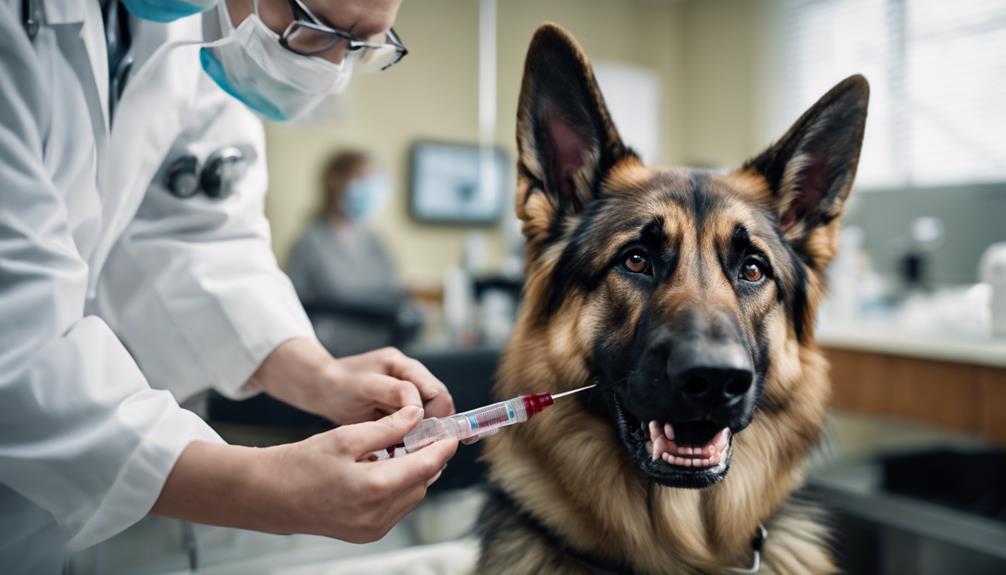🐾 Paw-some Partnership Alert! 🐾
As a pack of German Shepherd enthusiasts at MixGermanShepherd.com, we're always sniffing out the best products for our furry friends. Guess what? When you fetch something from Amazon through our links, we earn a little treat! 🦴
Just like a delicate tapestry, the health of German Shepherd mixes can be intricately woven by breeding practices. Understanding how breeding impacts the well-being of these beloved canines is crucial. From the prevalence of genetic disorders to the importance of responsible breeding practices, there are many facets to explore in this complex issue. Unraveling the intricacies of how breeding influences the health of German Shepherd mixes can shed light on the path towards ensuring a brighter, healthier future for these remarkable dogs.
Key Takeaways
- Genetic diversity in German Shepherd mixes can reduce health risks associated with selective breeding.
- Crossbreeding can help mitigate hereditary health issues in German Shepherd mixes.
- Mixing breeds enhances overall health and vitality in German Shepherd mixes.
- Responsible breeding practices are essential to ensure the well-being of German Shepherd mixes.
Breeding Practices Affecting Health Outcomes

Breeding practices significantly impact the health outcomes of German Shepherd mixes, particularly influencing issues like hip dysplasia, pannus, and dental problems. When breeders selectively choose mating pairs based on desirable traits, they inadvertently perpetuate genetic predispositions to these health concerns. German Shepherd dogs bred for specific physical attributes may possess genes that increase the likelihood of hip dysplasia, a condition where the hip joint doesn't develop properly, leading to mobility issues. Pannus, an eye disease that can cause blindness if left untreated, is also linked to breeding traits in German Shepherds. Furthermore, dental problems such as early tooth loss or misalignments can be exacerbated by breeding practices that prioritize appearance over health.
To mitigate these issues, genetic testing plays a crucial role in identifying and preventing the perpetuation of harmful traits. By incorporating health screening into breeding programs, breeders can enhance the overall well-being of German Shepherd mixes. While puppies from health-screened litters may come with higher initial costs, the investment can lead to savings on future veterinary bills and promote the welfare of these beloved canine companions.
Genetic Diversity in German Shepherd Mixes

German Shepherd mixes display a greater range of genetic diversity compared to purebred counterparts. This increased genetic variation can contribute to a decreased likelihood of hereditary health concerns. The mix of genetic backgrounds in German Shepherd mixes may result in a healthier and more robust canine population.
Genetic Variation Importance
Genetic diversity in mixes of the German Shepherd breed plays a vital role in reducing the likelihood of inherited health issues. When considering the importance of genetic variation in German Shepherd mixes, remember these key points:
- Broadening Gene Pool: Mixing breeds can expand genetic diversity, potentially enhancing overall health and vigor.
- Mitigating Genetic Disorders: Avoiding inbreeding through crossbreeding helps decrease the occurrence of hereditary conditions.
- Hybrid Vigor: German Shepherd mixes may benefit from hybrid vigor, increasing their resilience to certain health issues.
- Introducing New Traits: Crossbreeding can introduce novel genetic traits that contribute to a healthier and more robust population of canines.
Health Implications of Mixes
Pivoting from the discussion on genetic variation importance, the health implications of mixes, particularly regarding genetic diversity in German Shepherd mixes, are crucial in enhancing overall well-being and longevity. When considering mixes, the incorporation of various genetic backgrounds can result in a more resilient and healthier canine companion. This increased genetic diversity in German Shepherd mixes can lead to a reduction in inherited health issues commonly observed in purebred dogs. The table below highlights the key benefits of genetic diversity in mixes:
| Benefits of Genetic Diversity in German Shepherd Mixes | |
|---|---|
| Reduced Risk of Inherited Health Issues | |
| Enhanced Overall Health and Vitality | |
| Longer Lifespan due to Reduced Genetic Disorders |
Health Risks of Inbreeding

Inbreeding poses significant health risks to German Shepherd mixes, increasing the likelihood of genetic disorders and hereditary conditions such as hip dysplasia and degenerative myelopathy. When German Shepherd mixes are bred through inbreeding, several detrimental consequences may arise:
- Reduced Genetic Diversity: Inbreeding diminishes the gene pool diversity, leading to an accumulation of harmful recessive genes in German Shepherd mixes.
- Increased Incidence of Diseases: German Shepherd mixes resulting from inbreeding are more prone to a variety of physical and neurological health issues.
- Risk of Inherited Conditions: Inbreeding heightens the chances of passing on hereditary conditions like hip dysplasia and degenerative myelopathy to offspring.
- Challenges in Mitigation: Overcoming the health risks associated with inbreeding in German Shepherd mixes requires responsible breeding practices such as outcrossing and genetic testing.
Impact of Designer Dog Breeding

Designer dog breeding, with its intentional mixing of breeds, can lead to an array of health risks in German Shepherd mixes. These risks encompass not only physical ailments like hip dysplasia and heart issues but also behavioral challenges that arise from the melding of different genetic backgrounds. The ongoing debate over the ethics of such breeding practices underscores the importance of understanding the potential consequences for the well-being of these mixed-breed dogs.
Health Risks in Mixes
Introducing a diverse genetic background through designer dog breeding can heighten the health risks faced by German Shepherd mixes.
- Mixes may inherit health issues from both parent breeds, compounding the risk of certain conditions.
- Crossbreeding can yield unpredictable health outcomes due to the lack of standardized health testing.
- German Shepherd mixes could be susceptible to hip dysplasia, heart conditions, and genetic disorders inherited from parent breeds.
- Varying degrees of health issues may arise in German Shepherd mixes due to the absence of uniform breeding practices.
Breeding Ethics Debate
Breeding mixed-breed dogs with specific traits can lead to ethical debates surrounding the potential health risks associated with genetic variability, especially in the context of German Shepherd breeding traits. Designer dog breeding, which involves crossing different purebred dogs to create mixed breeds with desired characteristics, has sparked controversy. Critics argue that this practice prioritizes profit over animal welfare, potentially compromising the health of the offspring. Supporters, on the other hand, emphasize the attractiveness of unique traits and hypoallergenic qualities in these mixed breeds. However, the unpredictable nature of mixed-breed health, stemming from diverse genetic backgrounds, can significantly impact overall well-being. When considering the breeding of German Shepherds and other mixed breeds, it is essential to weigh these ethical concerns against the desire for specific traits.
Behavioral Issues Arising
Genetic variability resulting from mixed-breed designer dog breeding practices can manifest in unpredictable behavioral issues, particularly in German Shepherd mixes. When considering the impact of designer dog breeding on behavioral issues, several key points emerge:
- Temperament Traits: Mixing breeds without regard for temperament traits can lead to aggression or fearfulness.
- Conflicting Genetic Tendencies: Behavioral problems in mixed breeds may arise from conflicting genetic tendencies.
- Lack of Breed Standard: The absence of a breed standard in mixes can contribute to unstable behavior patterns.
- Management Strategies: Proper socialization and training are essential for addressing potential behavioral challenges in German Shepherd mixes.
Health Considerations for Mixed Breeds

Considering the diverse genetic backgrounds of mixed breed dogs, their health outcomes often demonstrate significant advantages over those of purebred dogs. Mixed breed dogs tend to have lower instances of genetic health issues due to hybrid vigor, which can lead to better overall health and longevity. The wider gene pool present in mixed breeds reduces the risk of inherited diseases commonly seen in purebred dogs, including German Shepherds.
Health concerns specific to purebred German Shepherds, such as hip dysplasia or degenerative myelopathy, may be minimized in mixed breed German Shepherd mixes. By adopting a mixed breed German Shepherd mix, individuals can benefit from a unique combination of traits without the same level of health risks associated with purebred dogs. These health considerations make mixed breed German Shepherd mixes an attractive option for those seeking a companion with potentially fewer predisposed health issues.
Consequences of Irresponsible Breeding

Irresponsible breeding practices significantly impact the health outcomes of German Shepherd mixes. When breeding is not conducted responsibly, the consequences can be severe for the offspring:
- Increased Risk of Inherited Disorders: German Shepherd mixes bred irresponsibly are more likely to inherit genetic health issues from their parent breeds.
- Proliferation of Hereditary Health Concerns: Irresponsible breeding perpetuates the transmission of genetic diseases within the German Shepherd mix population.
- Lack of Health Screenings: Without proper health screenings, breeders may overlook underlying health conditions that can be passed down to the offspring.
- Heightened Risk of Hereditary Health Issues: German Shepherd mixes born from irresponsible breeding face a heightened risk of developing hereditary health problems throughout their lives.
These consequences emphasize the critical need for responsible breeding practices to safeguard the health and well-being of German Shepherd mixes. By promoting ethical breeding standards and genetic testing, the incidence of hereditary health issues in these beloved mixes can be significantly reduced.
Mixed Breed Health Concerns

When assessing the health of mixed breed German Shepherds, a comprehensive understanding of their diverse genetic composition is crucial for tailored healthcare strategies. Mixed German Shepherds may inherit health issues from both purebred parents, including common concerns like hip dysplasia and degenerative myelopathy. However, the concept of hybrid vigor in mixed breeds can sometimes mitigate the likelihood of genetic health problems observed in purebred German Shepherds. Due to their more diverse genetic makeup, mixed German Shepherds might have a reduced risk of certain hereditary conditions. Health screenings conducted for both purebred parents can significantly diminish the chances of passing on genetic health concerns to mixed breed offspring. It is important to note that mixed German Shepherds may manifest a blend of traits and health predispositions from various breeds, necessitating customized health care and vigilant monitoring to address potential German Shepherd health concerns effectively.
Breeding Impact on Mixed Breed Longevity

The breeding of mixed breed dogs significantly impacts their longevity through the introduction of genetic diversity, which can enhance overall health and reduce the prevalence of breed-specific health conditions. When considering the breeding impact on German Shepherd Mix, it is essential to acknowledge the following:
- Hybrid Vigor: Crossbreeding German Shepherds with other breeds can result in hybrid vigor, potentially reducing the risk of hereditary health issues commonly seen in purebred German Shepherds.
- Healthier Gene Pool: Breeding mixed breed dogs contributes to a healthier gene pool, lowering the occurrence of breed-specific health conditions and promoting longevity.
- Combined Genetic Traits: German Shepherd Mix dogs often inherit a combination of genetic traits from both parent breeds, leading to improved overall health and potentially longer lifespans.
- Mitigating Inherited Health Problems: The practice of crossbreeding can help mitigate the impact of inherited health problems associated with specific purebred lines, promoting better health outcomes in mixed breed dogs.
Health Implications of Crossbreeding

Crossbreeding German Shepherds with other breeds can result in a healthier gene pool and improved overall health outcomes for German Shepherd mixes by introducing greater genetic diversity. This practice helps reduce the incidence of genetic health issues commonly seen in purebred German Shepherds. By mixing breeds, there is a potential for increased longevity and a decreased risk of breed-specific ailments. The concept of hybrid vigor in German Shepherd mixes leads to enhanced immunity and resilience to certain health conditions. Responsible crossbreeding practices are essential in mitigating hereditary health concerns prevalent in purebred German Shepherds.
| Health Implications of Crossbreeding | Benefits |
|---|---|
| Reduced genetic health issues | ✔ |
| Increased longevity | ✔ |
| Decreased risk of breed-specific ailments | ✔ |
| Enhanced immunity | ✔ |
| Resilience to health conditions | ✔ |
Breeding Influences on Mixed Breed Temperament

Introducing diverse genetic influences through breeding significantly shapes the temperament of mixed breed dogs, including those with German Shepherd lineage. When considering the impact of breeding on mixed breed temperament, especially in German Shepherd mixes, it is crucial to understand how specific breeding traits can influence behavior and characteristics. Here are some key points to consider:
- Blend of Traits: German Shepherd mix temperament may exhibit a combination of loyalty, intelligence, and protective instincts, depending on the breed mix.
- Behavioral Variation: Breeding can lead to a wide range of temperamental variations in mixed breed dogs, highlighting the importance of understanding the specific traits inherited.
- Trainability Factors: The temperament of a German Shepherd mix can be influenced by the trainability associated with different breeds in the mix, affecting ease of training and behavior modification.
- Socialization Impact: Socialization, training, and individual genetic factors all play a role in shaping the temperament of a mixed breed dog, emphasizing the need for early and consistent socialization practices.
Mixed Breed Health Testing Importance

Considering the influence of breeding on mixed breed temperament, an essential aspect to address is the significance of mixed breed health testing to identify genetic predispositions and potential health issues. Health testing in mixed breeds, including those with German Shepherd heritage, plays a crucial role in early detection and prevention of common health conditions. By conducting these tests, owners can proactively manage the health of their dogs, leading to better overall outcomes and enhanced quality of life. Specific health risks identified through testing allow for targeted care strategies, ensuring that any potential issues are addressed promptly and effectively. Moreover, the insights gained from mixed breed health testing empower owners to make informed decisions regarding their dog's healthcare needs. Therefore, investing in health testing for German Shepherd mixes is not just beneficial but essential for safeguarding their well-being and promoting a healthy and fulfilling life.
Breeding Ethics for German Shepherd Mixes

When considering breeding ethics for German Shepherd mixes, it is crucial to prioritize responsible practices to ensure the health and well-being of the offspring. Ethical breeders focus on genetic testing and health screening to prevent hereditary health issues in these mixes. The long-term impact of breeding practices on the health and temperament of German Shepherd mixes should be carefully considered to maintain ethical standards.
Ethics in Mix Breeding
Responsible mix breeding practices for German Shepherd mixes prioritize health, temperament, and genetic diversity to reduce the prevalence of hereditary health issues. When it comes to ethics in mix breeding, consider the following:
- Health Screening: Conduct thorough genetic testing and health screenings to ensure the well-being of German Shepherd mix puppies.
- Temperament Assessment: Evaluate the temperament of the parent breeds to predict the behavior of the offspring.
- Genetic Diversity: Introduce genetic variation to reduce the risk of inherited diseases and promote overall health.
- Long-Term Health Focus: Emphasize the long-term health and welfare of German Shepherd mixes over superficial physical traits.
Health Considerations in Breeding
To ensure the optimal health and well-being of German Shepherd mixes, prioritizing genetic health considerations such as hip dysplasia, pannus, and heart problems is crucial in breeding practices. The bottleneck effect in the gene pool of German Shepherd mixes can exacerbate the prevalence of these health disorders. Genetic testing plays a pivotal role in preventing the perpetuation of such issues. Health screening during breeding enhances the overall health of German Shepherd mixes, decreasing future health problems. While initial costs for puppies from health-screened litters may be higher, they can lead to significant savings on vet bills in the long run. By focusing on these health considerations, breeders can contribute to the betterment of German Shepherd mix health and promote responsible breeding practices.
Frequently Asked Questions
What Are the Negative Effects of Selective Breeding on German Shepherds?
When considering the negative effects of selective breeding on German Shepherds, it's crucial to prioritize genetic diversity and ethical breeding practices. Maintaining a diverse gene pool through responsible breeding can mitigate health issues commonly seen in this breed.
Do German Shepherd Mixes Have Health Problems?
You might wonder about the health of German Shepherd mixes. These dogs can have health issues. However, with genetic diversity, proper care, and screening, you can increase their longevity, meet their exercise needs, and ensure proper socialization.
How Does Inbreeding Affect German Shepherds?
Inbreeding in German Shepherds reduces genetic diversity, leading to an increased likelihood of health issues. Behavior problems can arise due to limited gene pool. Structural abnormalities and immune deficiencies are more prevalent in inbred dogs.
How Many Times Can You Safely Breed a German Shepherd?
You should limit breeding a German Shepherd to around 3-4 litters to safeguard their health. Responsible breeding practices emphasize allowing sufficient recovery time between litters, preventing physical strain and emotional stress on the female.
Conclusion
In conclusion, the breeding practices for German Shepherd mixes can have a profound impact on their overall health and well-being. Just as a skilled gardener carefully tends to their plants to ensure growth and vitality, responsible breeding practices are essential for producing healthy and thriving mixed breed dogs. By cultivating a diverse gene pool and prioritizing health screening, breeders can help ensure that these beloved companions blossom into strong and resilient animals.
